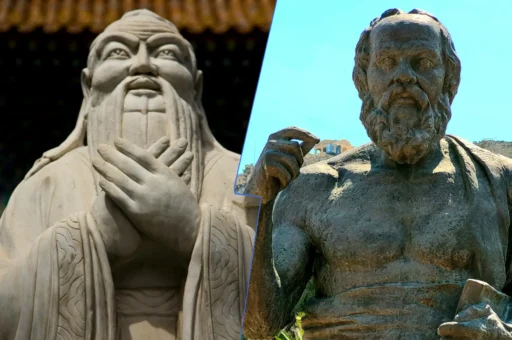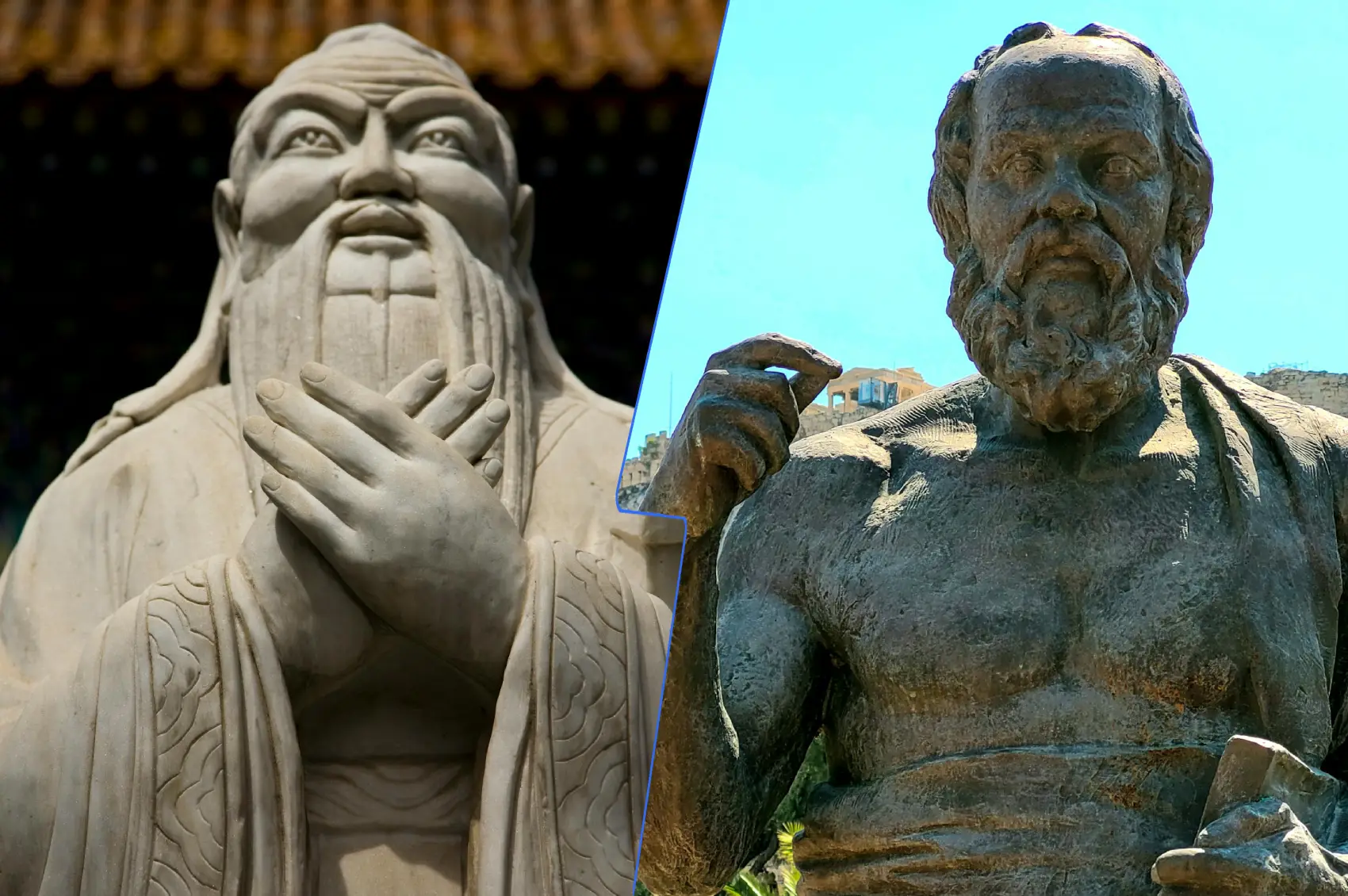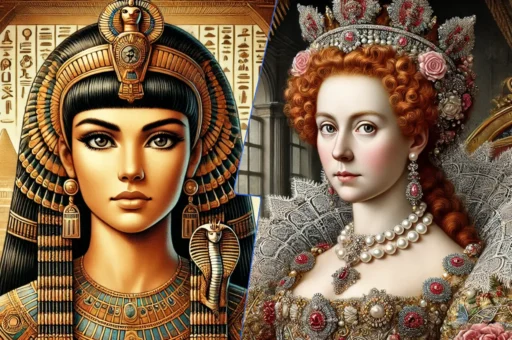Introduction
Confucius and Socrates are two of the most influential philosophers in history. Their teachings have shaped societies and thought systems for centuries. This article explores their lives, philosophies, and enduring legacies, providing a comprehensive comparison of these two iconic figures.
Early Life and Backgrounds
Confucius
Confucius was born in 551 BCE in Qufu, in the state of Lu, China. His original name was Kong Qiu, and he came from a family of modest means. Despite his relatively humble beginnings, Confucius received a good education and became passionate about learning and moral philosophy. Throughout his life, he emphasized the importance of education, family values, and social harmony. He passed away in 479 BCE, leaving behind a legacy that profoundly influenced Chinese culture and beyond.
Socrates
Socrates was born in 469 BCE in Athens, Greece. Unlike Confucius, Socrates came from a family of artisans—his father was a stonemason, and his mother was a midwife. Socrates did not document his teachings; instead, his philosophy is known through the works of his students, notably Plato. Socrates dedicated his life to questioning the status quo and seeking truth and wisdom through dialogue. He died in 399 BCE after being sentenced to death for impiety and corrupting the youth of Athens.
Philosophical Contributions
Confucius
Confucius’s philosophy centered on ethics, politics, and social relationships. His key concepts include Ren (benevolence), Li (ritual propriety), and Xiao (filial piety). He believed that moral virtue and proper conduct were the foundations of a harmonious society.
Achievements
- The Analects: A collection of his teachings compiled by his disciples.
- Confucianism: A philosophical system that influenced East Asian cultures.
- Emphasis on Education: Advocated for accessible education for all.
- Civil Service Exams: Inspired the merit-based civil service system in China.
- Social Harmony: Promoted values that emphasize family and societal harmony.
Socrates
Socrates’s philosophy focused on ethics, epistemology, and the dialectical method. He believed that knowledge and virtue were intrinsically linked and that questioning was essential to gaining wisdom.
Achievements
- Socratic Method: A form of cooperative argumentative dialogue to stimulate critical thinking.
- Ethical Inquiry: Emphasized the importance of living a virtuous and examined life.
- Influence on Plato and Aristotle: His teachings shaped Western philosophy through his students.
- Critique of Athenian Society: Challenged the moral and political assumptions of his time.
- Legacy of Intellectual Inquiry: His approach laid the groundwork for the Western tradition of philosophical inquiry.
Personal Lives and Social Interactions
Confucius
Confucius was known to be humble and dedicated to his teachings. Although he faced hardships, including political exile, he remained committed to spreading his philosophy. He had several disciples who helped propagate his ideas. Confucius valued friendships and mentorships, fostering a close-knit group of followers who carried on his legacy.
Socrates
Socrates lived a life marked by his relentless pursuit of truth. He was known for his distinctive method of questioning, which often made him unpopular among the Athenian elite. Despite his controversial methods, he had a loyal circle of friends and students, including Plato and Xenophon. Socrates was married to Xanthippe and had three children. His friendships and dialogues with younger Athenians were instrumental in disseminating his ideas.
Achievements and Influences
Confucius
Confucius left an indelible mark on Chinese society and beyond. His teachings influenced various aspects of life, from government and education to personal conduct and family relationships. His followers continued to spread his teachings, establishing Confucianism as a dominant philosophical system in East Asia.
Socrates
Socrates’s legacy is equally profound. His method of inquiry and emphasis on ethical living inspired generations of philosophers. Through the works of his students, especially Plato, Socrates’s ideas became foundational to Western philosophy. His questioning approach and search for truth continue to inspire modern philosophical thought.
Unique Attributes and Global Resonance
Confucius
Confucius’s emphasis on social harmony, respect for elders, and the importance of education resonated deeply within Chinese culture. His ideas have been integral to the development of East Asian civilizations and continue to influence contemporary thought and policy in these regions.
Socrates
Socrates’s commitment to seeking truth through dialogue and his willingness to challenge societal norms made him a unique figure in Western philosophy. His ideas about ethics, virtue, and knowledge remain relevant today, inspiring ongoing debates in philosophy, politics, and education.
Comparisons and Conclusions
Comparing Confucius and Socrates highlights both their similarities and differences. Both philosophers sought to improve society through their teachings, yet they approached this goal in distinct ways. Confucius emphasized social harmony and proper conduct, while Socrates focused on ethical inquiry and critical thinking. Their unique approaches to philosophy have left lasting legacies that continue to shape our understanding of the world.
Engage with Us
What do you think about the philosophies of Confucius and Socrates? Share your thoughts and insights in the comments below! Don’t forget to share this article on social media to spark more discussions about these remarkable philosophers.
Inbound Link Suggestions:
- Masters of Art: Leonardo da Vinci vs. Vincent van Gogh
- Comparing Two Giants: Abraham Lincoln & George Washington





